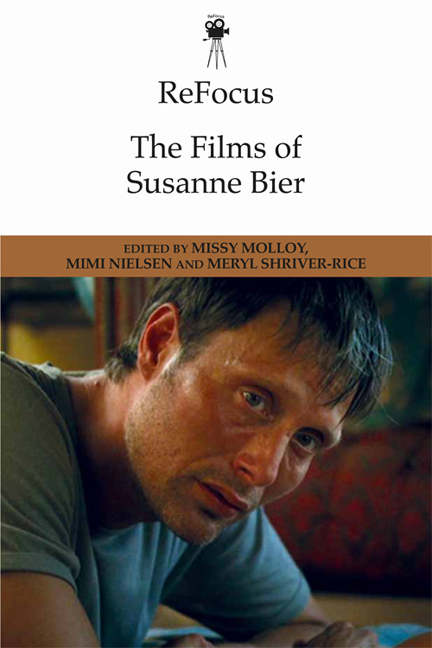Book contents
- Frontmatter
- Contents
- List of Figures
- Notes on Contributors
- Foreword
- Introduction: Susanne Bier's Boundary-Crossing Screen Authorship
- Part 1 Generic and Industrial Fluidity
- Part 2 Negotiating Identity
- Part 3 Authorship and Aesthetics
- Part 4 Transnational Reach
- Postscript: A Conversation with Susanne Bier
- Filmography of Susanne Bier
- Acknowledgments
- Index
3 - Susanne Bier's Hollywood Experiments: Things We Lost in the Fire and Serena
Published online by Cambridge University Press: 01 May 2021
- Frontmatter
- Contents
- List of Figures
- Notes on Contributors
- Foreword
- Introduction: Susanne Bier's Boundary-Crossing Screen Authorship
- Part 1 Generic and Industrial Fluidity
- Part 2 Negotiating Identity
- Part 3 Authorship and Aesthetics
- Part 4 Transnational Reach
- Postscript: A Conversation with Susanne Bier
- Filmography of Susanne Bier
- Acknowledgments
- Index
Summary
INTRODUCATION
In an interview published in Kosmorama in 2010, Eva Novrup Redvall asked frequent Susanne Bier collaborator Thomas Anders Jensen to comment on the differences between European and American film industries on one hand, and Danish on the other (Redvall 2010: 86). He replied, “the main difference is that you do not get a chance abroad. You get one go. What you deliver must really be in order. In Denmark, you can present something in progress that you involve people in, get feedback on, and discuss. That you cannot do with producers abroad” (Jensen quoted in Redvall 2010: 86, my translation).
Yet Bier's experiences abroad contradict Jensen's evaluation; she has gotten several chances to direct English-language, U.K./U.S. co-productions despite notable setbacks. The British-produced, American-distributed Things We Lost in the Fire (2007), starring Halle Berry and Benicio del Toro, received tepid reviews on release and was dismissed as “awards bait” that failed to replicate Bier's then-recent successes with English-speaking audiences via the Danish-language films Open Hearts (Elsker dig for evigt, 2002), Brothers (Brødre, 2004), and After the Wedding (Efter brylluppet, 2006) (Holden 2007; Smith 2007; Whipp 2007). The film's theatrical run yielded only fifty percent of the film's production cost, and, despite generating positive reviews (for del Toro's performance in particular), Things We Lost in the Fire failed to generate the award nominations which, according to some critics, motivated its production. Furthermore, several reviews of the film specifically criticized stylistic features that had been praised in Bier's Danish-language international hits (Whipp 2007; Ebert 2007), which indicates that strategies that worked for her in past productions were not as effective in the new context.
Things We Lost in the Fire's underwhelming response appears enthusiastic in comparison to Bier's next “Hollywood” production, Serena (2014), a commercial failure that generated the worst reviews of her career and is distinguished as the only Jennifer Lawrence/Bradley Cooper collaboration not to have generated a profit. Thus, while it can be said that as Bier's international reputation blossomed she savvily managed directing opportunities, in the process overcoming setbacks related to her nationality and gender, Things We Lost in the Fire and Serena stand out as conspicuous anomalies in the career of a filmmaker otherwise known for successful generic and industrial fluidity (Agger 2015).
- Type
- Chapter
- Information
- ReFocus: The Films of Susanne Bier , pp. 56 - 78Publisher: Edinburgh University PressPrint publication year: 2018



